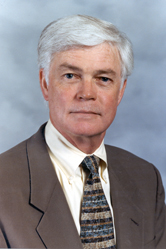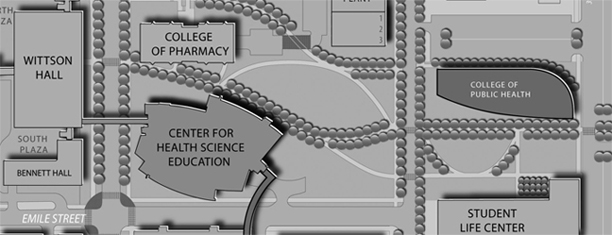Nebraska’s health professionals and the communities they serve will be better prepared to meet increasing threats to the public’s health – ranging from obesity to the avian flu – if a proposed College of Public Health becomes reality, UNMC officials say.
University officials will present their proposal for a UNMC College of Public Health on June 15 to the Academic Affairs Committee of the NU Board of Regents. The regents will not vote on the college’s formation but may do so at a meeting later this year.
“The need for public health services in Nebraska is increasing, and we must educate and train individuals to provide these services,” UNMC Chancellor Harold M. Maurer, M.D., said. “Driving the need for the college are many emerging and critical health issues, including biosecurity; emerging diseases with pandemic potential such as SARS and avian flu; and increasing public health risks such as obesity, substance abuse, inadequate prenatal care and age-related diseases.”
 |
Dr. Noren |
“Dr. Noren is a perfect fit for this position,” Dr. Maurer said. “Throughout his career, Jay has demonstrated a tremendous propensity for taking on new projects and making them succeed. I have no doubt that he’ll do the same thing with our College of Public Health.”
Dr. Noren noted the rarity of the opportunity to develop a new college and serve as its founding dean.
“When you couple that with the fact that the new college addresses the discipline to which I have devoted my teaching and research efforts throughout my academic career, it’s an opportunity I couldn’t pass up,” Dr. Noren said. “Of course, starting a new college is no small task. It is extremely complicated. However, the enthusiasm of the faculty and leadership at UNMC combined with the history of innovation at the medical center makes this a very exciting challenge, with dramatic potential for far reaching benefit to Nebraska.”
Through its ability to shape policy and translate research into better practices, the college would increase the state’s ability to respond to changes in workforce trends, increased immigration and shifting population patterns, threats to safety and biosecurity, and expanding local health agencies, Dr. Noren said.
The proposed College of Public Health would be based at UNMC and would work closely with the other three University of Nebraska campuses. The college would also work with community partners across the state to further its mission, and it would educate and train Nebraska’s growing public health workforce, Dr. Maurer said.
Rubens Pamies, M.D., vice chancellor for academic affairs at UNMC, said that the College of Public Health would unite some of the university’s current assets so that it can make great contributions in preventing disease and promoting health. Those assets include world-renowned faculty in the areas of emergency preparedness, rural health, health disparities, employee health, informatics and other areas, Dr. Pamies said.
The college, he said, would build upon the successful collaboration of the existing Masters of Public Health program between UNMC and the University of Nebraska at Omaha. That program, which began in 2002, quickly gained full accreditation as a graduate program with concentrations in two of five core areas of public health: health administration and health education.
The UNMC College of Public Health would become the 39th such college or school in the United States, but the only one west of the Missouri River except for programs in Texas, California, Arizona, Oklahoma and Washington. The formation of the college would allow the university to compete for many federal or philanthropic monies for which it has previously been ineligible.
“By becoming a college, we leverage existing resources and attract new resources from the public and private sectors for education, research and service in prevention and population health,” Dr. Pamies said. “More importantly, this college will help us to meet the divergent health needs of emerging populations and will open opportunities to diversify faculty, staff and students at the University of Nebraska.”
Dr. Maurer noted the potential economic impact of the college. Initial estimates indicate that the college could bring in $30 million in new funds within five years, resulting in a $67.5 million boon to the state’s economy and 700 to 750 new jobs.
University of Nebraska President James B. Milliken said UNMC has made a strong case for organizing the University’s relevant programs under a College of Public Health.
“In light of the prominence of public health issues and their importance to Nebraska, consideration now of a College of Public Health that brings together expertise from all campuses of the University under the leadership of the medical center is timely and strategic,” Milliken said. “Dr. Noren has been instrumental in assisting in the development of this proposal and will provide expert guidance during this critical planning stage and as the founding dean if the Board of Regents approves the new college.”
A native of Minnesota, Dr. Noren earned his undergraduate and medical degrees from the University of Minnesota and a master’s degree in public health from Harvard University. In addition, he completed three research fellowships in public health, first at the Harvard Center for Community Health and Medical Care, then as a Robert Wood Johnson Health Policy Fellow at the National Academy of Sciences, and finally as a Winston Churchill Fellow in England and Scotland. Dr. Noren did his graduate and post-graduate work in health policy, health services research, preventive medicine, public health and internal medicine at Harvard, the University of Vermont and Michigan State University.
He served on the faculty at the University of Wisconsin-Madison in the Department of Preventive Medicine from 1976 to 1998. Dr. Noren was vice chancellor for health sciences at Wisconsin for eight years and served as director of the Center for Health Policy and Program Evaluation for 10 years. He also served as a visiting faculty member at the University of Washington School of Public Health.
For two years (1993 to 1995), he took leave from Wisconsin to serve as interim chancellor for the Minnesota State Colleges and Universities. In this position, he was responsible for merging three separate higher education systems into a single system, comprised of 62 campuses, 163,000 students, 21,000 faculty and staff and an $850 million annual budget.
In 1999, he was appointed founding president of the newly created University Health Science Center at Texas A&M University, also serving as vice chancellor for health affairs. In this position, he was charged with integrating five colleges and satellite campuses in seven separate state locations into one organization.
At Texas A&M, he also held faculty appointments as professor in the George Bush School of Government and Public Service, the Department of Family and Community Medicine, and the Department of Public Health Sciences. In 2001, he was named director of the Health Workforce Project, National Institute of Health Policy.
Since joining the University of Nebraska in 2002, Dr. Noren has had responsibility for university oversight of all new and existing academic programs, including residential and distance delivery. He is the liaison with the board of regents on academic policy and has had central responsibility for programmatic aspects of annual and biennial budget development and analysis and the state-funded Nebraska Research Initiative.
 |
The possible location of the proposed College of Public Health. |